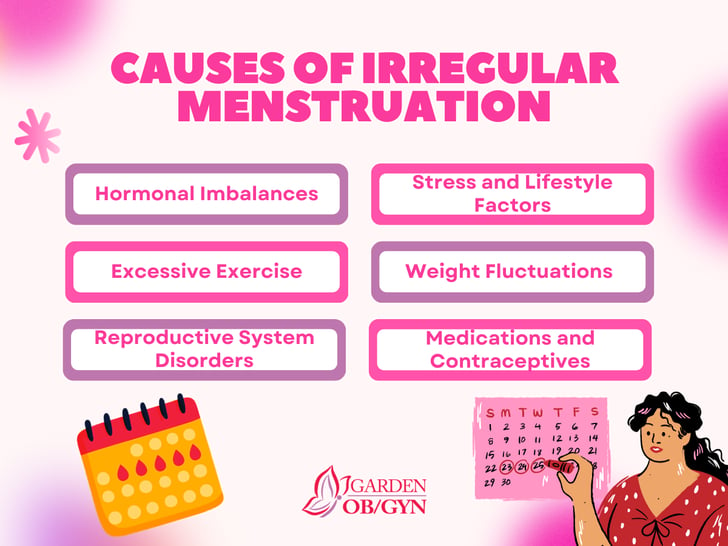Causes of Irregular Menstruation
Irregular menstruation is characterized by variations in the length of menstrual cycles or unexpected changes in flow, can be attributed to a variety of factors.

Menstruation is a natural and vital aspect of a woman's reproductive health. However, for many women, the regularity of their menstrual cycles can be disrupted, leading to irregular menstruation. This condition, characterized by variations in the length of menstrual cycles or unexpected changes in flow, can be attributed to a variety of factors. Understanding these causes is crucial for both women and healthcare professionals to address the underlying issues and promote overall well-being.
- Hormonal Imbalances:
One of the primary causes of irregular menstruation is hormonal imbalances. Hormones play a crucial role in regulating the menstrual cycle, and any disruption in their balance can lead to irregular periods. Conditions such as polycystic ovary syndrome (PCOS), thyroid disorders, and hormonal contraceptives can impact the delicate hormonal equilibrium, resulting in irregular menstrual cycles.
- Stress and Lifestyle Factors:
The modern lifestyle is often characterized by high levels of stress, inadequate sleep, and poor dietary habits. These factors can significantly influence hormonal production and lead to irregular menstruation. Chronic stress triggers the release of cortisol, a hormone that can interfere with the normal functioning of reproductive hormones. Adopting stress-management techniques, ensuring sufficient sleep, and maintaining a healthy lifestyle can help mitigate these influences.
- Excessive Exercise:
While regular physical activity is essential for overall health, excessive exercise can contribute to irregular menstruation. Intense workouts or rigorous training can affect hormonal levels, particularly in athletes or individuals engaging in strenuous physical activities. Striking a balance between exercise and rest is crucial to maintaining a healthy menstrual cycle.
- Weight Fluctuations:
Significant fluctuations in body weight, whether due to rapid weight loss or gain, can impact hormonal balance and disrupt the menstrual cycle. Women with eating disorders, such as anorexia nervosa or bulimia, may experience irregular periods. Achieving and maintaining a healthy weight through a balanced diet and regular exercise is essential for menstrual regularity.
- Reproductive System Disorders:
Certain reproductive system disorders can contribute to irregular menstruation. Conditions such as uterine fibroids, endometriosis, and pelvic inflammatory disease (PID) can affect the normal functioning of the reproductive organs, leading to irregular bleeding patterns. Seeking medical attention for proper diagnosis and treatment is crucial for managing these disorders and restoring menstrual regularity.
- Medications and Contraceptives:
The use of certain medications, including some types of contraceptives, can influence menstrual cycles. Changes in birth control methods or the introduction of new medications may cause temporary irregularities. It is important to communicate openly with healthcare providers to find suitable alternatives or solutions to minimize disruptions.
Irregular menstruation is a common concern for many women, and its causes can vary widely. Recognizing the factors that contribute to irregular periods is essential for addressing underlying issues and promoting reproductive health. While some causes may require medical intervention, adopting a healthy lifestyle, managing stress, and maintaining a balanced weight can contribute to the overall well-being of women and help regulate menstrual cycles. Consulting with healthcare professionals for personalized guidance and treatment is crucial for those experiencing persistent irregularities.
































